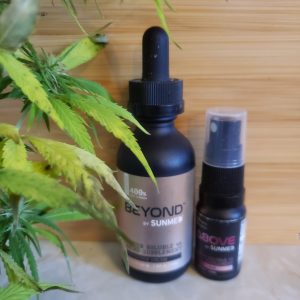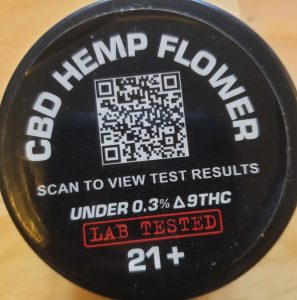
Although marijuana is still classified as a controlled substance, certain cannabis compounds have health benefits that can help treat chronic medical conditions. As research evolves, the medical potential is becoming more evident. Not only is CBD rich in powerful antioxidants, but it can also help protect against the damage caused by oxidative stress and improve recovery.
As a neuroprotectant, claims suggest that some active compounds in marijuana can limit the damage after ischemic insults or in treating neurodegenerative diseases (Alzheimer’s, Parkinson’s). Even the federal government recognizes the potential medical uses presented by the CBD compound.
Though it is widely available, the misconceptions surrounding this particular product continue to grow. Cannabidiol is derived from the cannabis sativa plant, which includes both hemp and marijuana. Hemp-derived CBD contains less than .3 percent tetrahydrocannabinol (THC), which is the substance responsible for the mind-altering effects of marijuana. CBD made from hemp is typically referred to as ‘broad spectrum’ and legal under federal law.
CBD made from cannabis, on the other hand, usually contains a higher concentration of THC. While it doesn’t produce the psychoactive effects of marijuana, it can make you fail a drug test. This type of ‘full spectrum’ CBD is still illegal under federal law even though some state laws do allow it.
Government Involvement in CBD Studies

CBD is not yet regulated by the FDA, so people often assume there is no scientific evidence supporting its effectiveness. That could be due, at least in part, to the confusion between hemp-derived and cannabis-derived CBD.
The fact that marijuana itself is still classified as a controlled substance on the federal level is also a contributing factor. While the Drug Enforcement Agency (DEA) claims there are no accepted medical uses for cannabis and cannabis derived products, that just doesn’t seem to be the case. More clinical studies are needed but cannabidiol research has been conducted with very promising results.
The potential uses for CBD are exciting enough that the US Government quietly held a patent on it for more than a decade. While the patent was temporary, it gave them time to conduct extensive clinical research on the effectiveness of this product as a treatment for specific illnesses.
Scientists discovered an endocannabinoid system in the human body which is heavily involved in pain regulation, sleep, immune system response and other vital bodily functions. People have used CBD with great success to help with symptoms of insomnia, depression, Parkinson’s, autism, ADHD and more. In some countries it is even used to help treat addiction and ease withdrawal symptoms.
Extensive literature has been published on how cannabis derived CBD limits neurological damage after trauma and stroke incidents. The literature further names oxidative, age, autoimmune and inflammatory related diseases specifically as conditions that can possibly be successfully treated with the cannabis derived compound.
Neuroprotectant, Anti-inflammatory, Antioxidant Properties
CBD contains natural anti-inflammatory properties that can make you feel more relaxed, but it typically won’t get you high. It does, however, play a vital role in the inhibition of Fatty Acid Amide Hydrolase, also referred to as FAAH. This process creates higher levels of endocannabinoids that encourage the neural generation of pleasure and motivation in the human body.
CBD contains other little-known characteristics that are showing incredible promise. Ingestion of high-quality cannabidiol stimulates the body’s own endocannabinoid system and promotes homeostasis. To fully appreciate the potential of this powerful product, you must understand the role neurons play in the brain.
Neurons are the brain cells responsible for interaction. As an essential part of the brain and nervous system, they are responsible for the communications that make it possible to move. These little cells send motor commands, receive sensory input, and relay electrical signals.
When neurons become damaged, physical function can be inhibited and entire systems within the human body can malfunction. Neuroprotectants help preserve neuronal structure and function which can aid in healing while inhibiting the progression of certain illnesses.
CBD contains neuroprotective properties which can help reduce damage to the brain and nervous system. It has also been shown to contain powerful antioxidants that could aid in slowing the progression of certain degenerative illnesses. Current studies suggest that CBD helps minimize neural damage and can even promote healing.
Case Studies and Potential Uses
CBD is currently marketed as a supplement which is not regulated by the FDA. This brings scrutiny to the safety and purity of each product. Effective therapeutic doses for different conditions can be difficult to pinpoint and should be addressed individually. Here are some of the most common current uses for CBD.
Treating epilepsy
- In 2018, the FDA approved CBD as a treatment for two separate conditions, each characterized by epileptic seizures. Lennox-Gastaut Syndrome involves multiple types of seizures in children ages three to five years old. Dravet Syndrome is a genetic condition that appears early and involves frequent seizures with fever.
Anti-seizure effects
- In a double-blind study, patients suffering from seizures were divided into two groups. One group was administered 300mg of cannabidiol daily and the other group was given a placebo for 18 weeks. The group who was given CBD showed significant improvement and some patients were completely free of seizure episodes. The placebo group showed no improvement.
Treatment for people with schizophrenia
- Studies were conducted on rodents and healthy volunteer patients with experimental psychosis. CBD was shown to prevent psychosis in all models with a promising safety profile. It was also shown to have a similar pharmacological profile to atypical antipsychotic drugs used to treat schizophrenia.
Fighting cancer
- The British Journal of Clinical Pharmacology published studies indicating that the use of CBD can help stop the growth of cancer cells. It promotes their destruction and significantly reduces the spread of cancer with lower toxicity than other options.
Treating chronic anxiety
- Other studies show that CBD can be used to treat a range of neuropsychiatric disorders involving the nervous system. Cannabidiol showed strong promise in the treatment of chronic anxiety and associated disorders, such as post-traumatic stress syndrome and obsessive-compulsive behaviors.
Treating diabetes
- Studies conducted in 2016 showed that CBD based treatment was effective in reducing the inflammation that occurred when the immune system attacks pancreatic cells. This reduction in pancreatic inflammation can prevent or delay the development of type 1 diabetes. Another study in Portugal showed similar results the same year.
Treating acne
- The Journal of Clinical Investigation published a 2014 study on the effects of CBD as a treatment for acne. It showed that inflammation of the sebaceous glands is a heavy contributor to the condition and cannabidiol lowered the production of acne producing sebum by reducing inflammation.
Preventing development of Alzheimer’s disease
- The Journal of Alzheimer’s Disease published a study showing the effects of CBD on transgenic mice in early stages of the disease. After careful study and testing, the mice who regularly ingested CBD retained their social recognition ability. The study effectively showed that CBD can at least slow the progression of the disease and help people retain the ability to recognize faces.
Anti-inflammatory, or for natural pain relief
- A study published in the Journal of Experimental Medicine showed that ingesting CBD reduces inflammation associated with chronic pain and other conditions. Additional studies in rats showed that it significantly reduced the pain response to incision and sciatic nerve pain.
While the study of cannabidiol is still in its infancy, the medical community is finding that it is highly effective in treating many various conditions. Unfortunately, all CBD products are not created equally. As with any product, there are differing qualities.
A low-quality product will not offer the therapeutic benefits of good CBD compounds. Most reputable companies engage in third party lab testing and make their results publicly available. Companies who produce and sell a high-quality product will be transparent about their practices. Remember, it is always best to consult a physician before taking any supplement.






